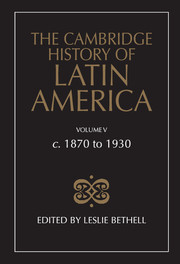Book contents
- Frontmatter
- PART ONE MEXICO
- PART TWO CENTRAL AMERICA AND THE CARIBBEAN
- PART THREE THE RIVER PLATE REPUBLICS
- PART FOUR THE ANDEAN REPUBLICSo
- PART FIVE BRAZIL
- 19 The Brazilian economy, 1870–1930
- 20 Brazil: the age of reform, 1870–1889
- 21 Brazil: the social and political structure of the First Republic, 1889–1930
- Bibliographical essays
- References
19 - The Brazilian economy, 1870–1930
from PART FIVE - BRAZIL
Published online by Cambridge University Press: 28 March 2008
- Frontmatter
- PART ONE MEXICO
- PART TWO CENTRAL AMERICA AND THE CARIBBEAN
- PART THREE THE RIVER PLATE REPUBLICS
- PART FOUR THE ANDEAN REPUBLICSo
- PART FIVE BRAZIL
- 19 The Brazilian economy, 1870–1930
- 20 Brazil: the age of reform, 1870–1889
- 21 Brazil: the social and political structure of the First Republic, 1889–1930
- Bibliographical essays
- References
Summary
The 60 years between 1870 and 1930 which comprise the last two decades of the empire and the whole of the First Republic represent the apogee of export orientation in Brazilian economic history. Resources were shifted by government and the private sector to export production, and exports rose from £1.31 to £2.83 per capita from the decade of the 1870s to that of the 1920s, a gain of about 1.6 per cent a year. Much of the social transformation and economic diversification experienced during the period, including European immigration, urbanization, improvements in communications and transportation and a modest level of industrialization, clearly derived from the expansion of exports. This expansion was also the principal attraction of foreign capital. The level of British and United States investments rose from £53 million in 1880 to £385 million by 1929. The world depression of the 1930s brought this era to a close. Exports ceased to exercise a dynamic influence on the economy and autarky and import-substitution had to be increasingly employed thereafter to try to stimulate further growth.
Exports appear to have been the principal stimulus to the onset of per capita economic growth, which seems not to have begun until shortly before 1900. There is no certainty concerning the rate of that growth, since national accounts have only been kept since 1947. An average rate of per capita growth of gross domestic product of almost 2.5 per cent a year has been calculated for the period 1900 to 1929, but downward correction may be necessary.
- Type
- Chapter
- Information
- The Cambridge History of Latin America , pp. 683 - 724Publisher: Cambridge University PressPrint publication year: 1986
References
- 13
- Cited by

